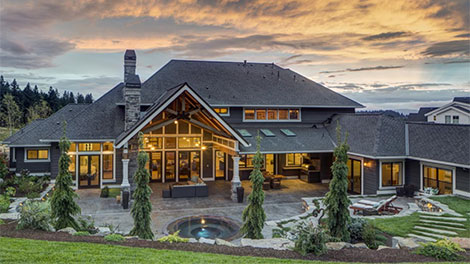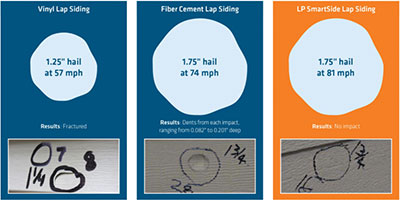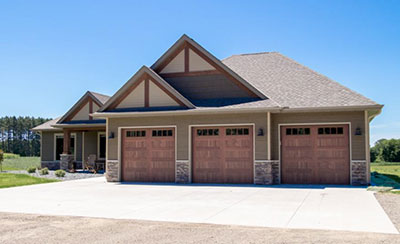
.png)
Search By Square Foot
• Up to 1000 Sq Ft
• 1001 - 1500 Sq Ft
• 1501 - 2000 Sq Ft
• 2001 - 2500 Sq Ft
• 2501 - 3000 Sq Ft
• 3001 - 3500 Sq Ft
• 3501 - 4000 Sq Ft
• 4001 - 4500 Sq Ft
• 4501 - 5000 Sq Ft
• 5001 Sq Ft And Up
Search By Square Foot
• Up to 1000 Sq Ft
• 1001 - 1500 Sq Ft
• 1501 - 2000 Sq Ft
• 2001 - 2500 Sq Ft
• 2501 - 3000 Sq Ft
• 3001 - 3500 Sq Ft
• 3501 - 4000 Sq Ft
• 4001 - 4500 Sq Ft
• 4501 - 5000 Sq Ft
• 5001 Sq Ft And Up
by Rachel Lyon, Editorial Director for The House Designers®
They may not happen as often as other weather events, but hailstorms can do serious damage to your home. According to the National Oceanic and Atmospheric Administration (NOAA), hail causes an annual average of more than a billion dollars in damage to property and crops, and while the worst affected area known as Hail Alley encompasses a triangle from west Texas up through South Dakota and out to Missouri, major hailstorms have occurred in all 50 states. With storm intensity and incidence increasing, it’s only natural that homeowners want to invest in siding that’s up to the challenge—here’s what you should know.

How Hail Causes Damage
When you think of something that falls from the sky to damage your home, the roof is probably your primary concern. An impact-resistant roof is a must, of course, but siding is a critical component of a home’s envelope that is too often overlooked. Hail doesn’t just fall in a straight line down—wind drives it to come in on an angle so it pelts the sides of a house. That’s why it’s common for an entire wall of siding to need replacement while other parts of the home escape relatively unscathed, although bouncing hailstones and changing winds can cause damage all around.
The cost to re-side a hail-damaged home often runs into the tens of thousands of dollars, and you should fix it as soon as possible. Cracks and holes leave the frame and interior open to moisture intrusion, which can lead to mold and dry rot. Unfortunately, the process is frequently held up by trying to find a product that matches the surviving siding, or else having to re-side the entire house at once. When it comes to the havoc hail can wreak, an ounce of prevention is definitely worth a pound of cure, so it’s a good idea to invest in materials that can withstand the challenge.

How Sidings Resist Impact Damage
There’s a lot of choice to be had in the siding market, and a lot of variation in the quality of the products. The resilience of different materials is based in their physical characteristics, most notably their elasticity. You probably think that a sturdier product is best, but hardness without springiness is a recipe for breakage. You can see this when popular types of siding are put to the test, whether in the lab or in the field.
The National Wind Institute’s Debris Impact Facility at Texas Tech University tested comparable vinyl, fiber cement, and engineered wood lap sidings to see how they fared against hail conditions. Hailstones of increasing size were fired at measured speeds and the effects on the points of impact were observed. Hail of 1.25-inch diameter punched through vinyl siding at 57 miles per hour, while fiber cement was dented with 1.75-inch diameter hailstones fired at 74 miles per hour. The LP® SmartSide® engineered wood siding showed no signs of impact after being hit with 1.75-inch hail at 81 miles per hour.
The resilience of this product is thanks to its proprietary SmartGuard® process, which coats real wood with waxes to resist moisture, zinc borate to resist termites and fungal decay, and advanced binders and resins to hold it all together and provide the bounce that resists impact damage. Vinyl, fiber cement, and even natural solid wood are brittle by comparison, so they are more prone to breakage.

Why Engineered Wood Is a Great Choice
If you aren’t sold on using engineered wood siding on your home, consider this: LP® SmartSide® Trim & Siding is now warranted for hail damage for extra peace of mind. For complete warranty details, visit LPCorp.com. The 50-year prorated warranty is an attractive offer that includes a 5-year, 100% labor and material replacement warranty, too. Whether you choose lap, panel, or cedar texture shake siding, these products are beautiful, durable, and resist the many challenges that nature throws at them.
Better yet, they are also practical to install. LP® SmartSide® products come pre-primed and can be cut to size with regular woodworking tools, and because they are lightweight and come in larger lengths, installation time may be reduced. That also means fewer seams for wind to snag in a storm. If your main concern is for short-term convenience and/or you want to invest in an enduring siding choice, LP® SmartSide® Trim & Siding would be a fantastic addition to your home!